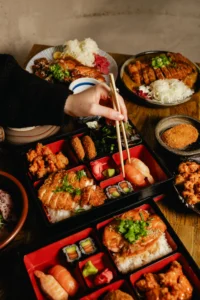Japanese Mindful Dining: Silence and Reflection
Japanese mindful dining has always celebrated more than taste alone, turning meals into moments of reflection and gratitude. Meals often become moments of reflection, where silence and intention shape every bite. By eating slowly, minimising conversation, and appreciating each flavour, dining transforms into a mindful practice that nurtures both body and spirit.
The Value of Silence in Japanese Mindful Dining
 Silence holds deep meaning in Japanese dining. While Western meals often focus on lively chatter, Japanese traditions encourage quiet appreciation. Silence allows diners to fully notice aroma, texture, and presentation. Moreover, it creates space for gratitude towards the chef, the ingredients, and the season itself.
Silence holds deep meaning in Japanese dining. While Western meals often focus on lively chatter, Japanese traditions encourage quiet appreciation. Silence allows diners to fully notice aroma, texture, and presentation. Moreover, it creates space for gratitude towards the chef, the ingredients, and the season itself.
Respect Through Quietness
Remaining quiet during a meal is not about ignoring others. Instead, it shows respect for the food and the act of eating. Every bite carries effort, from farmers to chefs. Silence acknowledges that labour. Therefore, each pause becomes a way of honouring their contribution.
Enhancing Focus
By eating without constant conversation, diners focus more closely on what rests before them. The taste of broth, the crispness of vegetables, or the subtle fragrance of rice become clearer. Silence enhances awareness, guiding attention to details that might otherwise be lost.
Mindful Pacing and Rituals
Japanese dining rituals emphasise careful pacing. Meals unfold step by step, with no rush to reach the end. This deliberate rhythm transforms eating into a calm and meditative act.
The Power of Small Portions
Dishes arrive in modest portions, designed to be savoured rather than hurried. Small servings naturally slow the pace. Consequently, diners take time to chew, taste, and reflect. In this way, eating becomes more mindful and nourishing.
Seasonal Appreciation
Japanese meals often highlight seasonal ingredients. By eating mindfully, diners notice the freshness of spring vegetables or the warmth of autumn flavours. Seasonal awareness deepens gratitude for nature and its cycles. Thus, pacing and mindfulness align closely with cultural respect for the changing seasons.
Japanese Mindful Dining as a Meditative Practice
In Japanese culture, dining does not simply satisfy hunger. Instead, it becomes an exercise in mindfulness and meditation.
Linking FoJapanese Mindful Diningod and Spirit
By focusing on each bite, diners connect food with inner calm. Every mouthful becomes an opportunity to centre the mind. This practice mirrors Zen principles, where stillness and attention bring balance. As a result, meals turn into more than nourishment – they become experiences of peace.
The Role of Minimal Conversation
Minimal conversation supports this meditative quality. While talking is not forbidden, it remains secondary to eating. Diners often exchange short remarks of appreciation, but avoid lengthy discussions. This practice keeps the focus on taste, texture, and gratitude.
Japanese Mindful Dining Lessons for Modern Life
 Today’s fast-paced lifestyle often reduces meals to rushed moments. Japanese mindfulness at the table offers a refreshing contrast.
Today’s fast-paced lifestyle often reduces meals to rushed moments. Japanese mindfulness at the table offers a refreshing contrast.
Slowing Down
By slowing down, people improve digestion and satisfaction. Moreover, they strengthen their connection with food. This mindful approach reminds us that eating deserves attention, not distraction.
Applying Mindfulness Beyond Japan
Anyone can embrace these practices, regardless of location. Eating silently, chewing slowly, or noticing seasonal foods requires no special setting. By doing so, everyday meals gain depth and meaning. Thus, mindfulness at the table becomes a universal lesson in respect and awareness.
Conclusion
Japanese dining culture teaches that silence and mindfulness enrich food experiences. Through quiet meals, deliberate pacing, and seasonal awareness, eating becomes more than consumption – it transforms into meditation. While rooted in tradition, these lessons carry value for modern life everywhere. By slowing down, minimising talk, and appreciating each detail, anyone can turn daily meals into moments of peace and gratitude.
